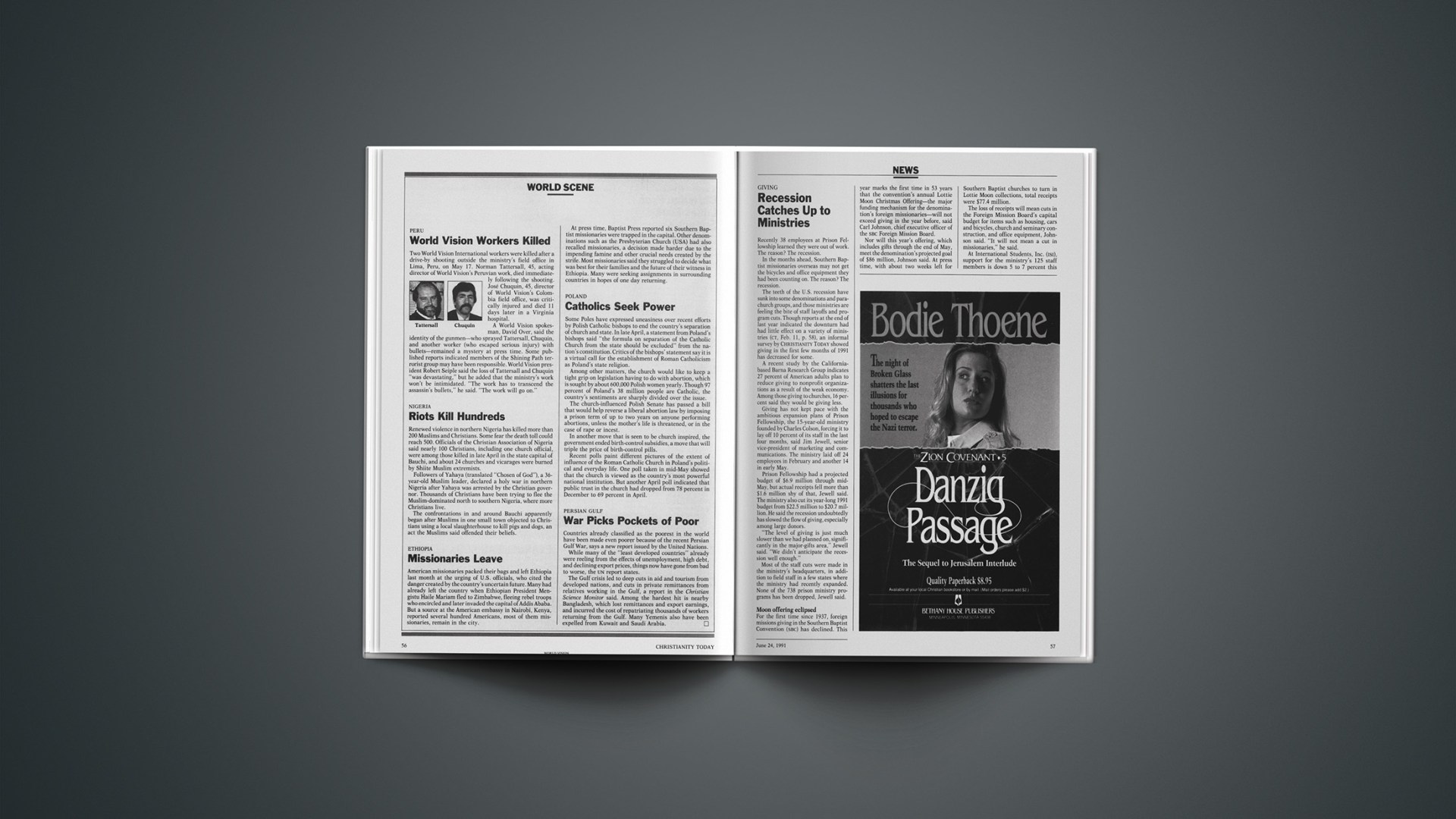Recently 38 employees at Prison Fellowship learned they were out of work. The reason? The recession.
In the months ahead, Southern Baptist missionaries overseas may not get the bicycles and office equipment they had been counting on. The reason? The recession.
The teeth of the U.S. recession have sunk into some denominations and parachurch groups, and those ministries are feeling the bite of staff layoffs and program cuts. Though reports at the end of last year indicated the downturn had had little effect on a variety of ministries (CT, Feb. 11, p. 58), an informal survey by CHRISTIANITY TODAY showed giving in the first few months of 1991 has decreased for some.
A recent study by the California-based Barna Research Group indicates 27 percent of American adults plan to reduce giving to nonprofit organizations as a result of the weak economy. Among those giving to churches, 16 percent said they would be giving less.
Giving has not kept pace with the ambitious expansion plans of Prison Fellowship, the 15-year-old ministry founded by Charles Colson, forcing it to lay off 10 percent of its staff in the last four months, said Jim Jewell, senior vice-president of marketing and communications. The ministry laid off 24 employees in February and another 14 in early May.
Prison Fellowship had a projected budget of $6.9 million through mid-May, but actual receipts fell more than $1.6 million shy of that, Jewell said. The ministry also cut its year-long 1991 budget from $22.5 million to $20.7 million. He said the recession undoubtedly has slowed the flow of giving, especially among large donors.
“The level of giving is just much slower than we had planned on, significantly in the major-gifts area,” Jewell said. “We didn’t anticipate the recession well enough.”
Most of the staff cuts were made in the ministry’s headquarters, in addition to field staff in a few states where the ministry had recently expanded. None of the 738 prison ministry programs has been dropped, Jewell said.
Moon Offering Eclipsed
For the first time since 1937, foreign missions giving in the Southern Baptist Convention (SBC) has declined. This year marks the first time in 53 years that the convention’s annual Lottie Moon Christmas Offering—the major funding mechanism for the denomination’s foreign missionaries—will not exceed giving in the year before, said Carl Johnson, chief executive officer of the SBC Foreign Mission Board.
Nor will this year’s offering, which includes gifts through the end of May, meet the denomination’s projected goal of $86 million, Johnson said. At press time, with about two weeks left for Southern Baptist churches to turn in Lottie Moon collections, total receipts were $77.4 million.
The loss of receipts will mean cuts in the Foreign Mission Board’s capital budget for items such as housing, cars and bicycles, church and seminary construction, and office equipment, Johnson said. “It will not mean a cut in missionaries,” he said.
At International Students, Inc. (ISI), support for the ministry’s 125 staff members is down 5 to 7 percent this year, says President Gordon Loux. Staff support, at $4 million, forms the largest chunk of ISI’S budget. Loux says the downturn should not affect ministry operations. He expects giving to return to normal as the recession eases.
Crisis Giving
While many organizations reported lean times, some continue to see gains. As of mid-May, World Vision was running 8 to 10 percent ahead of last year’s budget, said its vice-president of development, Craig Hammon.
“We had some concern. We continue to have some concern, especially with larger donors like real estate developers who may have been affected by the recession,” Hammon said.
Hammon credited improved communication with donors for beating the recession and said World Vision has experienced “a very generous response to this whole series of crises,” including the cyclone in Bangladesh and the African famine (see “A World of Hurts,” p. 48).
At Campus Crusade for Christ, fund raising has gone so well recently that development director Elvin Ridder has a difficult time explaining its success. Giving is up 15 percent this calendar year, he said, and gifts by major-gift donors is up 60 percent. “If there is a recession, we’re not seeing it,” he said.
The ministry’s plans to move from California to Orlando may be part of the giving surge. But Ridder has another hypothesis: “God’s grace.”
By Joe Maxwell.










